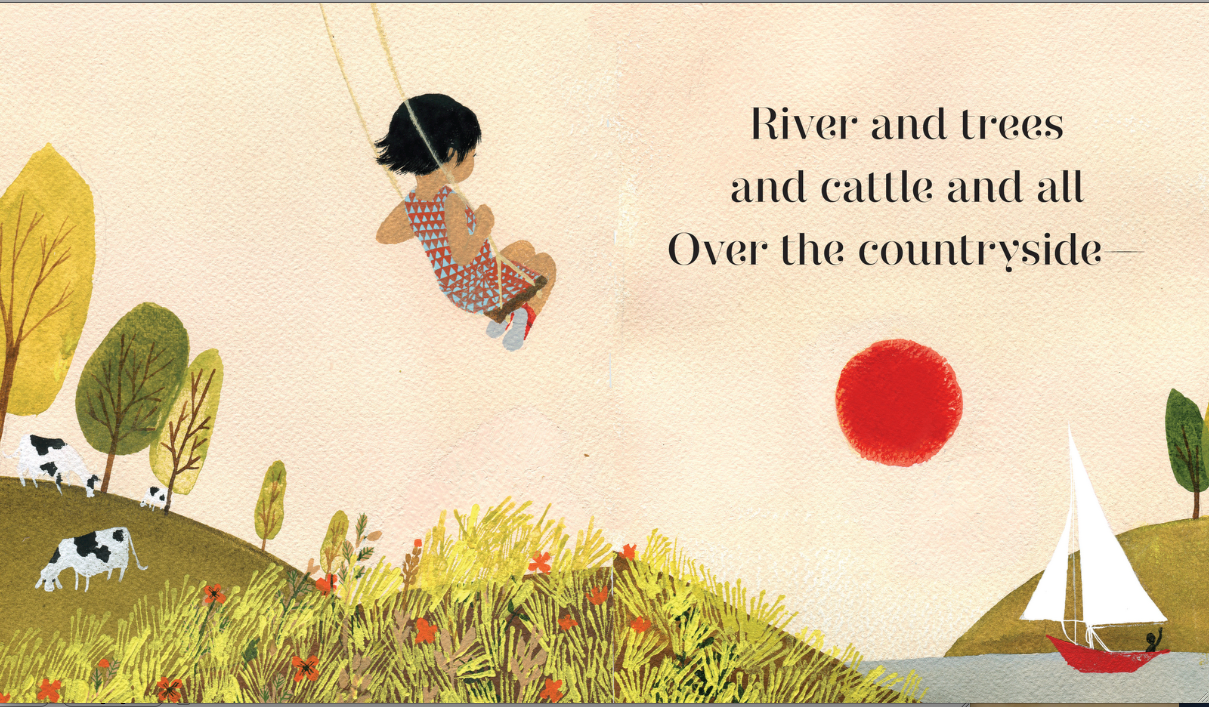I have always loved poetry. There is a musicality to it that makes it both pleasing to speak and easy to remember. So many poems from childhood, with their everyday themes, fit easily into the small moments of life. I can hardly push one of my own children, my nieces, or nephews in a swing without feeling the need to chant out Robert Louis Stephenson’s lines,
“Oh how I love to go up in a swing
Up in the sky so blue
Oh! I do think it the pleasantest thing ever a child can do.”
Thanks to the “Jabberwock”, which my eldest son learned to recite one year, I can hardly call one of my sons to me in pride without proclaiming, “Come to my arms – my beamish boy!”
Things remind me of poems and poems remind me of things. Who that has heard Robert Frost can pass through any sort of woods in winter without hearing the trees whisper,
“Whose woods these are, I think I know
His house is in the village though
He will not see me stopping here
To watch his woods fill up with snow.”
Poems, like stories and songs, are made for remembering and tend to stay with us as we grow. They have the potential to shape our language, our ideas, and the way we view the world. Think back on the oral traditions of the world, in which stories, songs, and epics have been used as tools for preserving, entertaining, and remembering. Our El Cids, our Illiads, and our Songs of Roland were not only stories but poems as well. Poetry can create humor or drama and conjure up images with its meter, rhyme, and frequent use of painted metaphors. It often does in just a few lines what it takes pages of prose to unfold. Consider the limerick – in just five short lines you can meet the protagonist, discover the plot, and reach both a climax and resolution:
There was an old man of Nantucket
Who kept all his cash in a bucket
His daughter, called Nan,
Ran away with a man,
And as for the bucket, Nantucket.
– Anonymous
Story was created to bring messages and meaning to life by illustrating for our imaginations a contextual picture painted with words. Poetry easily does the same, with a little extra charm and pizzazz. Although I love the childhood world created by Stevenson or the historical propaganda of Longfellow’s “Light Brigade”, it was the reading of Lord Byron’s “The Destruction of Sennacherib” that made me first realize how poetry can bring Bible stories to life as well.
I’m not sure why this never struck me before, considering the number of Psalms and other scriptures that have been set to music over the years. Still, they were poetic already. Upon reading “Sennacherib”, a seemingly dry Old Testament account became a romantic war story for my kids and I that filled our minds with images of the Assyrian coming down “like a wolf on the fold” and brought to life the mighty power of God as Jehovah Nissi, the Lord our Banner.
We all had a more “wow” view of God after reading the final lines, where Hezekiah’s enemies “melted like snow in the glance of the Lord.” My kids could feel the “cold turf” and hear the silence in the enemy tents. We could visualize the “foam of (the horses’) gasping” and hear the widows’ wails. The metaphor and meter of poetry brought it to life as if we had seen the movie in HD with 3-D glasses and surround sound speakers. After reading Byron’s version, you sort of feel like you were right there, on the Lord’s side, and can wave your imaginary spear around and tout, “Yeah – take that, Sennacherib!”
We will never again read that section of II Chronicles in the same light. I will include it below in the hopes that it puts you and your kids right there in God’s theater and helps you to realize that poetry is story, too.
The Destruction of Sennacherib
By Lord Byron (George Gordon)The Assyrian came down like the wolf on the fold,
And his cohorts were gleaming in purple and gold;
And the sheen of their spears was like stars on the sea,
When the blue wave rolls nightly on deep Galilee.Like the leaves of the forest when Summer is green,
That host with their banners at sunset were seen:
Like the leaves of the forest when Autumn hath blown,
That host on the morrow lay withered and strown.For the Angel of Death spread his wings on the blast,
And breathed in the face of the foe as he passed;
And the eyes of the sleepers waxed deadly and chill,
And their hearts but once heaved, and for ever grew still!And there lay the steed with his nostril all wide,
But through it there rolled not the breath of his pride;
And the foam of his gasping lay white on the turf,
And cold as the spray of the rock-beating surf.And there lay the rider distorted and pale,
With the dew on his brow, and the rust on his mail:
And the tents were all silent, the banners alone,
The lances unlifted, the trumpet unblown.And the widows of Ashur are loud in their wail,
And the idols are broke in the temple of Baal;
And the might of the Gentile, unsmote by the sword,
Hath melted like snow in the glance of the Lord!
- Epiphany- Where I Will Walk - January 20, 2020
- Stories that Ring True - May 27, 2019
- Providing Anchors - January 14, 2019

Leave a Reply